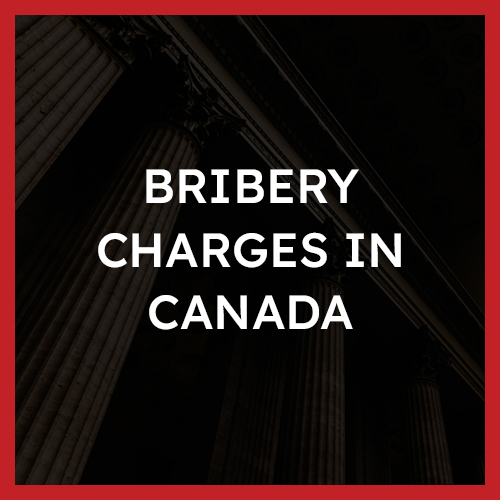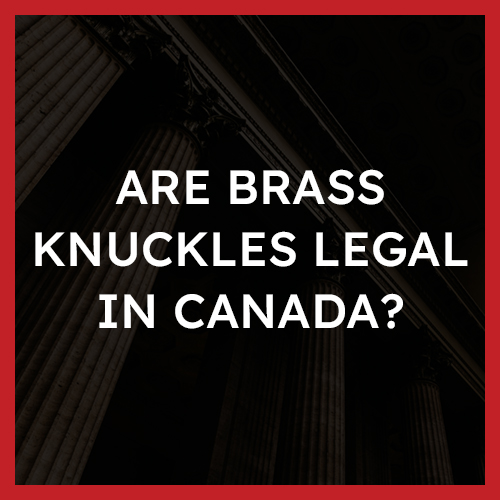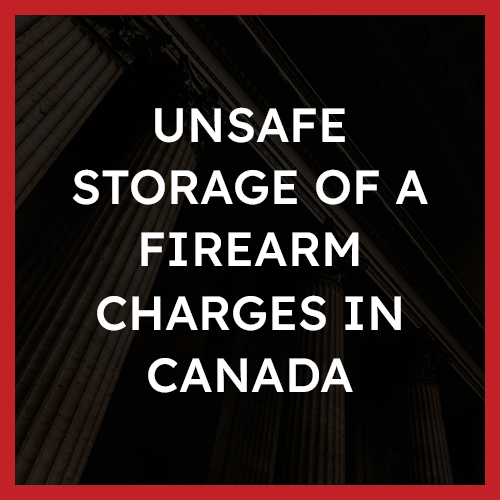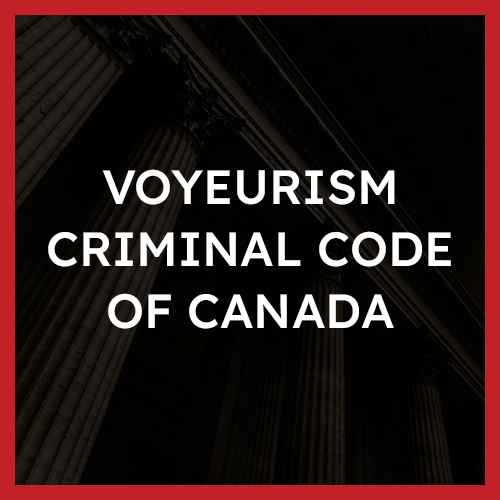Bribery (s. 119, 120) Laws in Canada
 What is Bribery?
What is Bribery?
Bribery is an offence under sections 119 and 120 of the Criminal Code of Canada.
In the Criminal Code of Canada, bribery is a criminal offence that involves offering, giving, receiving, or soliciting something of value in exchange for an act or omission, or for the exercise of influence or power.
Examples
Examples of the offence of Bribery may include:
- A person offers a police officer financial payment in order to exercise discretion on a traffic ticket, and the police officer does not issue a violation ticket, subsequent to acceptance of the bribe.
- A person offers a police officer expensive jewellery in order to let a family member off of a criminal charge with only a warning.
- A person offers a politician an expensive gift in order to vote in favour of passing a specific law, and the politician accepts
- A person offers a judge monetary payment in exchange for a lesser sentence
- A construction company executive offers a politician, who holds influence over building regulations and zoning, financial compensation in exchange of the politician ruling favourably for building approvals
- A bylaw enforcement supervisor accepts a gratuitous offer from the manager of a business for free items in order to direct bylaw enforcement away from a specific geographical location, at the instruction of the manager
Defences
A strong defence to a charge of bribery will vary depending on the circumstances of what occurred.
However, some defences may be:
- The police did not confirm that a transaction or bribe occurred.
- The accused did not know that the person was the holder of a judicial office, police officer, or other person named in the legislation.
- The identity of the accused, or date, time, or location which the offence occurred were not properly established by the police.
- There is a lack of material information which supports the allegation that the accused bribed another person. This may include a lack of documented evidence, physical evidence, or witness testimony.
- The Charter: if evidence was obtained through an unreasonable search or seizure, such evidence can be excluded. Again, it is advisable to discuss the evidence seized and the totality of the circumstances with a lawyer.
Punishment:
The maximum penalty for a conviction under Section 119 of the Criminal Code of Canada is a term of imprisonment of 14 years.
The maximum penalty for a conviction under Section 120 of the Criminal Code of Canada is a term of imprisonment of 14 years.
Whether you intend to plead guilty to a charge under section 119 or 120 of the Criminal Code of Canada, it is important to consult a lawyer prior. There may be factors which apply to your punishment/sentencing which are relevant and important for consideration, which may result in a lesser punishment.
Overview of the Offence
According to s. 119, 120 of the Criminal Code:
Bribery of judicial officers, etc.
119 (1) Every one is guilty of an indictable offence and liable to imprisonment for a term not exceeding fourteen years who
(a) being the holder of a judicial office, or being a member of Parliament or of the legislature of a province, directly or indirectly, corruptly accepts, obtains, agrees to accept or attempts to obtain, for themselves or another person, any money, valuable consideration, office, place or employment in respect of anything done or omitted or to be done or omitted by them in their official capacity,
or
(b) directly or indirectly, corruptly gives or offers to a person mentioned in paragraph (a), or to anyone for the benefit of that person, any money, valuable consideration, office, place or employment in respect of anything done or omitted or to be done or omitted by that person in their official capacity.
Consent of Attorney General
(2) No proceedings against a person who holds a judicial office shall be instituted under this section without the consent in writing of the Attorney General of Canada.
Bribery of officers
120. Every one is guilty of an indictable offence and liable to imprisonment for a term not exceeding fourteen years who
(a) being a justice, police commissioner, peace officer, public officer or officer of a juvenile court, or being employed in the administration of criminal law, directly or indirectly, corruptly accepts, obtains, agrees to accept or attempts to obtain, for themselves or another person, any money, valuable consideration, office, place of employment with intent
(i) to interfere with the administration of justice,
(ii) to procure or facilitate the commission of an offence, or
(iii) to protect from detection or punishment a person who has committed or who intends to commit an offence; or
(b) directly or indirectly, corruptly gives or offers to a person mentioned in paragraph (a), or to anyone for the benefit of that person, any money, valuable consideration, office, place or employment with intent that the person should do anything mentioned in subparagraph (a)(i), (ii) or (iii).
Bribery is a charge under sections 119 and 120 of the Criminal Code of Canada, depending on whether a police officer or justice, or parliamentarian or politicians, are the accused.
In order for a person to be convicted of bribery in criminal court, the crown is required to prove their case beyond a reasonable doubt. The crown must also prove several elements of the offence. The section defines the offence as the
as that a person, directly or indirectly, corruptly accepts, obtains, agrees to accept or attempts to obtain, for themselves or another person, any type of financial gain, valuable consideration, or benefit by them in their official capacity. The presumption of innocence applies in that the accused is presumed innocent until convicted of the offence.
A member of parliament or politician must be acting in their “official capacity” when taking ministerial actions related to the administration of their duties.
The Guilty Act (Actus Reus)
The actus reus for the offence of bribery is established by proof, beyond a reasonable doubt, of the following:
- The accused was holding a position official capacity, for section 119 of the criminal code the holder of a judicial office, or being a member of Parliament or of the legislature of a province,
And;
For section 120 of the criminal code, a justice, police or peace officer, or public officer;
The Guilty Mind (Mens Rea)
The mens rea for bribery is established by proof, beyond a reasonable doubt, of the following:
the accused knowingly and intentionally accepts, obtains, agrees to accept or attempts to obtain, for themselves or another person, any type of financial gain, or benefit, “corruptly”.
The term “corruptly” means “an act done by a man knowing that he was doing what was wrong and doing do with evil feelings and evil intentions.
Defences
How to beat a charge of bribery.
Each circumstance is different, and the best defence available is contextual based on the details. However, the following are some common defences that may be used against a charge of bribery:
Proving the identity of the accused
There are several aspects to this defence, however, one may rely on whether there was evidence seized by the police, which directly implicates the accused. The accused’s identity, as well as the date, time, and location of the offence, are necessary for the crown to prove beyond a reasonable doubt. If an offer or bribe was made without the accused identifying themselves, it is up to the crown to establish evidence relative to the accused’s identity.
Honest mistake/lack of mens rea
There are several aspects to this defence. The crown is required to prove, beyond a reasonable doubt, that the accused made the offer “corruptly”, therefore intentionally made the bribe for a corrupt purpose. If a person provides a police officer, or public officer, a gift as a means of showing thanks or gratitude for a past act, and does not expect favour in the future, this may be a defence. However, a lawyer should be consulted.
Lack of official capacity/ knowledge of official capacity/ lack of actus reus
The crown is required to prove beyond a reasonable doubt that the accused’s actions contributed to the corrupt purpose. If the accused made an offer to someone, without realizing their capacity and without expectations that the capacity would be used to gain advantage for a corrupt purpose.
Ensuring the evidence was obtained lawfully / Charter breaches
It is advisable to consult a lawyer in such circumstances, however, there may be circumstances where evidence was obtained from the accused person without their consent, and where they held a reasonable expectation of privacy. If this is the case, it is important to seek consultation from a lawyer to ensure that the accused’s rights under the Canadian Charter of Rights and Freedoms were not violated. If they were, there have been circumstances where the courts have deemed the evidence seized in this manner inadmissible.
If the police did not obtain a search warrant, or judicial authorization prior to seizing evidence, or the warrant is deemed unsatisfactory by a judge, this may result in a breach of section 8 of the charter. In addition, if information has been obtained from a laptop or cellular device that has been seized as evidence, it is important to determine the accused’s expectation of privacy in this context, and whether the police obtained warrants to search the devices, or were required to. There are remedies available under section 24 of the charter, which may include the exclusion of evidence or the charges to be stayed or dropped altogether.
Punishments
The maximum penalty for a conviction under Section 119 of the Criminal Code of Canada is a term of imprisonment of 14 years.
The maximum penalty for a conviction under Section 120 of the Criminal Code of Canada is a term of imprisonment of 14 years.
Whether you intend to plead guilty to a charge under section 119 or 120 of the Criminal Code of Canada, it is important to consult a lawyer prior. There may be factors which apply to your punishment/sentencing which are relevant and important for consideration, which may result in a lesser punishment.
Frequently Asked Questions
Is bribery an indictable offence?
Yes, under sections 119 and 120 of the criminal code, bribery is an indictable offence.
Could I go to jail if convicted of Bribery?
Yes, the maximum penalty, if convicted, is up to 14 years. It is highly advisable that you seek consultation with a lawyer.
What do I do if the police ask me about an incident involving Bribery?
A consultation with a lawyer is strongly advised prior to answering any questions from the police. At Strategic Criminal Defense, a free consultation is offered through our contact information. Production of a controlled substance is viewed by the courts as a very serious offence, as stated above, it is a straight indictable offence.
Published Decisions
R v. Duffy, 2016 ONCJ 220 (CanLII)
The accused was a public official, Senator Mike Duffy. He was charged with bribery under section 119 of the Criminal Code of Canada, related to a $90,000 cheque he received from Nigel Wright to pay back expense claims. The Crown argued the affair amounted to a bribe, although Wright himself was never charged. The accused was subsequently found not guilty,
You can read the full decision here.
R v Lam, 2014 ONSC 5355 (CanLII)
The accused was convicted for offering a bribe to police officers. The police unlawfully entered a storage locker belonging to the accused, at which time the accused offered the police officers approximately $300,000 worth of drugs in an attempt to negotiate his release. The police did not accept the offer, and the accused’s offer did not influence the police, and the accused was later convicted of bribery.
You can read the full decision here.
Arseneau v. The Queen, 1979 CanLII 216 (SCC), [1979] 2 SCR 136
The accused was convicted of bribery as a result of giving, or corruptly offering to give, money or valuable consideration to a politician (member of the legislative assembly) in the province of New Brunswick. The accused was a practising lawyer and advised a friend, who was a hotel operator and real estate developer in the area, that for a price of $10,000, he could obtain favours from his former partner, who was now the Minister of Tourism and Member of the Legislative Assembly. The elements of the offence that the transaction occurred for a corrupt purpose and that the MLA was acting in an official capacity were met, which was done for the purpose of seeking to receive a permit to build a hotel in a provincial park.
You can read the full decision here.
About The Author
Ask A Question
We endeavor to respond to questions within 24 hours. If your matter is urgent, please call our office or submit a request for a free consultation.





 What is Bribery?
What is Bribery?

